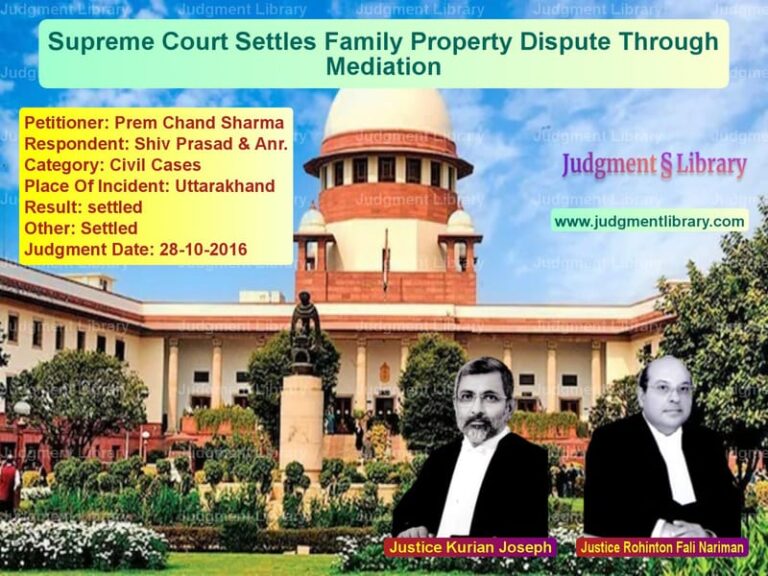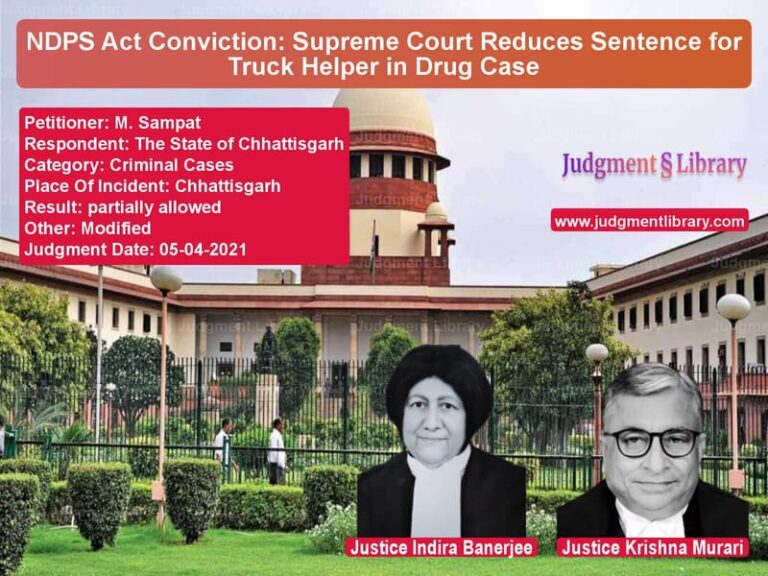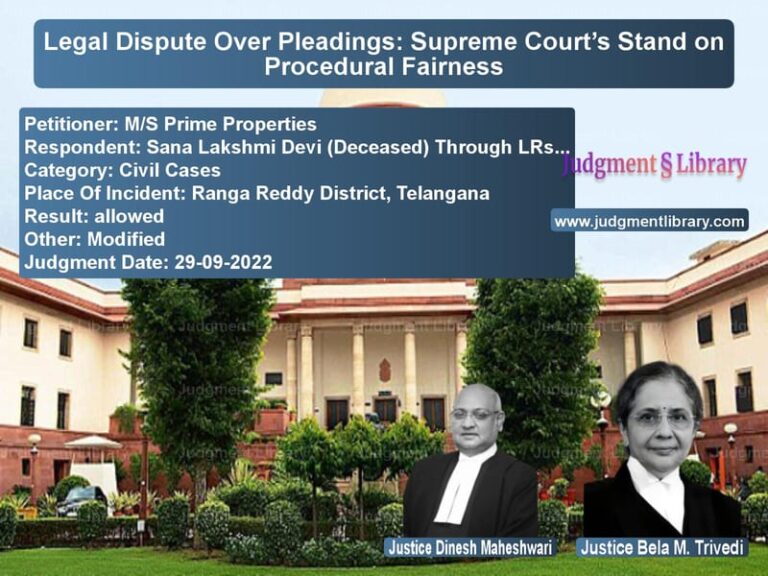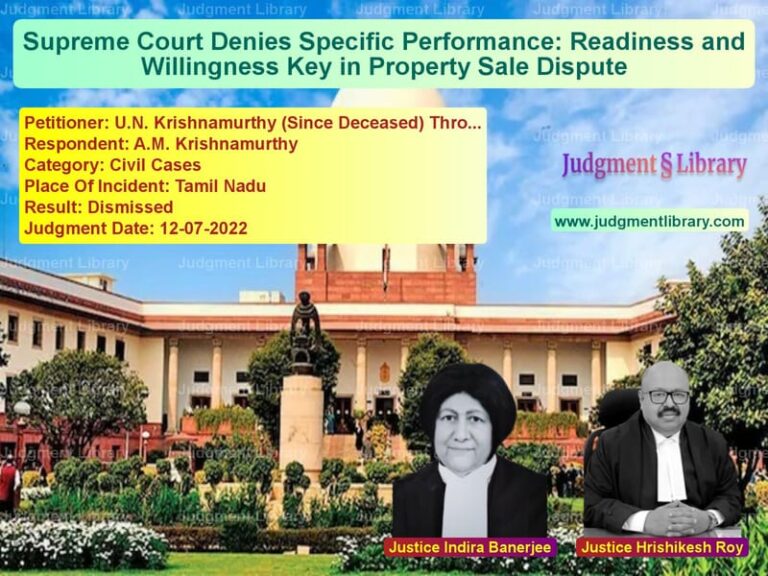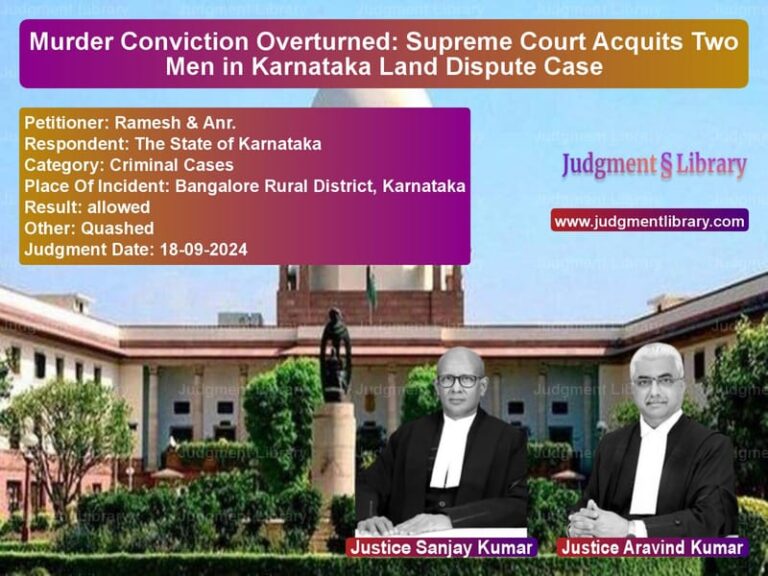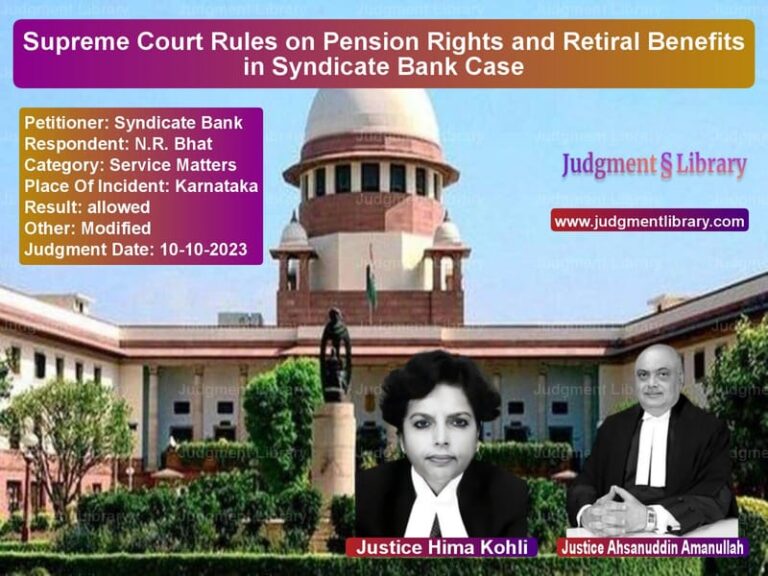Hamdard Laboratories Dispute: Supreme Court Clarifies Banking Operations and Management
The case of Hammad Ahmed v. Abdul Majeed & Ors. revolves around the internal dispute concerning the management and financial operations of Hamdard Laboratories (India). The Supreme Court clarified that its previous order did not establish joint management but only affirmed a banking arrangement between two factions of the trust. This case is significant for understanding corporate governance within trusts and business entities.
Background of the Case
The dispute arose over the control and financial administration of Hamdard Laboratories (India), a trust-run business entity. The appellant, Hammad Ahmed, claimed to be the Chief Mutawalli (trustee) of Hamdard Laboratories and sought an order restraining the respondents from interfering in its management.
Key Facts
- In a judgment dated April 3, 2019, the Supreme Court upheld Hammad Ahmed’s appointment as Chief Mutawalli.
- The respondents, including Abdul Majeed, continued to assert that they had joint control over the management of Hamdard Laboratories.
- The appellant alleged that the respondents were obstructing financial transactions, leading to difficulties in Hamdard’s operations.
- He sought directions from the Court to ensure that bank transactions proceeded smoothly.
Arguments of the Parties
Petitioner’s (Hammad Ahmed’s) Argument
- He contended that as Chief Mutawalli, he had the sole authority to operate the bank accounts of Hamdard Laboratories.
- The respondents were creating unnecessary obstacles by refusing to countersign financial documents.
- He requested the Court to grant him exclusive control over financial transactions.
- He also sought an order requiring respondents to hand over domain passwords and administrative controls for Hamdard’s digital assets.
Respondent’s (Abdul Majeed & Others) Argument
- They argued that the previous judgment did not give the appellant sole control over Hamdard Laboratories.
- The arrangement in place, according to them, required joint oversight of financial transactions.
- They opposed any unilateral changes in the financial operations of Hamdard Laboratories.
- They contended that the appellant’s attempt to claim full control over the organization was beyond the scope of the Court’s previous ruling.
Supreme Court’s Analysis
Clarification of Previous Order
The Court noted that its earlier judgment had been misinterpreted by both parties. It had intended to affirm the existing banking arrangement rather than grant full management control to the appellant.
“There is an inadvertent mistake in the judgment dated April 3, 2019, when the Court said that the parties will additionally continue with the arrangements arrived at in respect of the management of Hamdard.”
Correction of Terminology
The Supreme Court amended its previous ruling, stating that its intention was only to continue the banking arrangement, not to decide on overall management control.
“The word ‘management’ is an inadvertent mistake, which is required to be substituted by the word ‘banking operations’.”
Resolution on Banking Operations
The Court upheld the April 28, 2015, resolution, which specified that financial transactions required joint authorization from both groups.
“The arrangement in respect of banking operations arrived at in terms of the resolution dated April 28, 2015, shall continue.”
Encouragement for Amicable Resolution
The Court urged both parties to put aside their differences in the interest of Hamdard Laboratories’ legacy.
“It is not in the interest of either of the two groups to damage the goodwill of Hamdard only because they are not on the same page.”
Final Judgment
The Supreme Court ruled in favor of maintaining the joint banking arrangement but denied the appellant’s plea for full management control.
“We dispose of Miscellaneous Application Nos. 883-884 of 2019 by substituting the word ‘management’ in para 59 of the judgment dated April 3, 2019, with the word ‘banking operations’.”
The Court also dismissed related contempt petitions and applications regarding legal representation for Hamdard in other proceedings.
Significance of the Judgment
- Clarifies Legal Ambiguities: The ruling eliminates confusion about the Supreme Court’s previous decision regarding Hamdard’s management.
- Upholds Banking Oversight: Ensures that financial transactions are subject to joint control, preventing unilateral actions.
- Encourages Organizational Stability: Calls upon both factions to prioritize the trust’s mission over personal differences.
- Sets a Precedent for Trust Disputes: Reinforces that courts will not interfere in internal management unless explicitly required.
Conclusion
The Supreme Court’s ruling in Hammad Ahmed v. Abdul Majeed clarifies that the previous judgment did not establish joint management but only affirmed a banking arrangement. This decision ensures stability in the financial operations of Hamdard Laboratories while preventing unilateral control over its affairs. The Court’s guidance promotes amicable resolution and protects the institution’s long-term legacy.
Petitioner Name: Hammad Ahmed.Respondent Name: Abdul Majeed & Ors..Judgment By: Justice Uday Umesh Lalit, Justice Hemant Gupta.Place Of Incident: Delhi.Judgment Date: 09-07-2019.
Don’t miss out on the full details! Download the complete judgment in PDF format below and gain valuable insights instantly!
Download Judgment: Hammad Ahmed vs Abdul Majeed & Ors. Supreme Court of India Judgment Dated 09-07-2019.pdf
Direct Downlaod Judgment: Direct downlaod this Judgment
See all petitions in Corporate Governance
See all petitions in Company Law
See all petitions in Judgment by Uday Umesh Lalit
See all petitions in Judgment by Hemant Gupta
See all petitions in partially allowed
See all petitions in Modified
See all petitions in supreme court of India judgments July 2019
See all petitions in 2019 judgments
See all posts in Corporate and Commercial Cases Category
See all allowed petitions in Corporate and Commercial Cases Category
See all Dismissed petitions in Corporate and Commercial Cases Category
See all partially allowed petitions in Corporate and Commercial Cases Category


